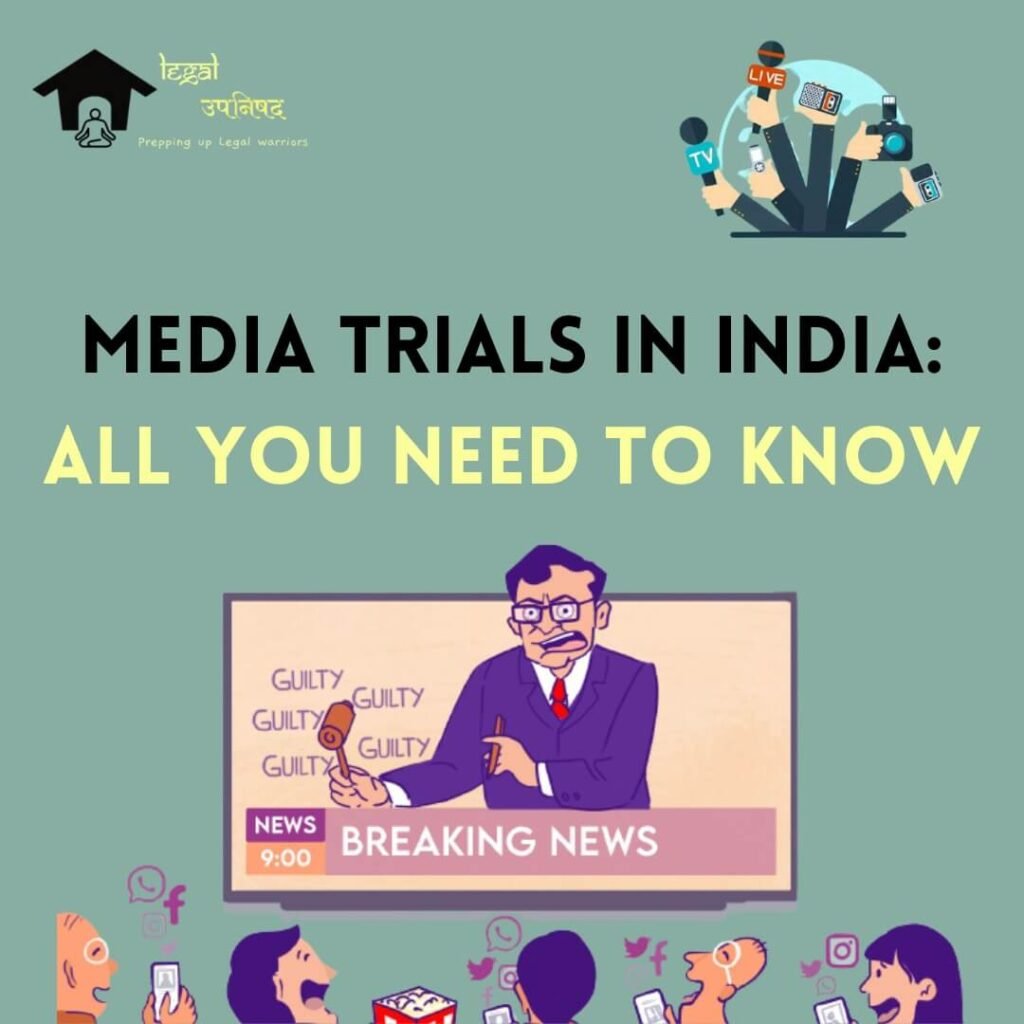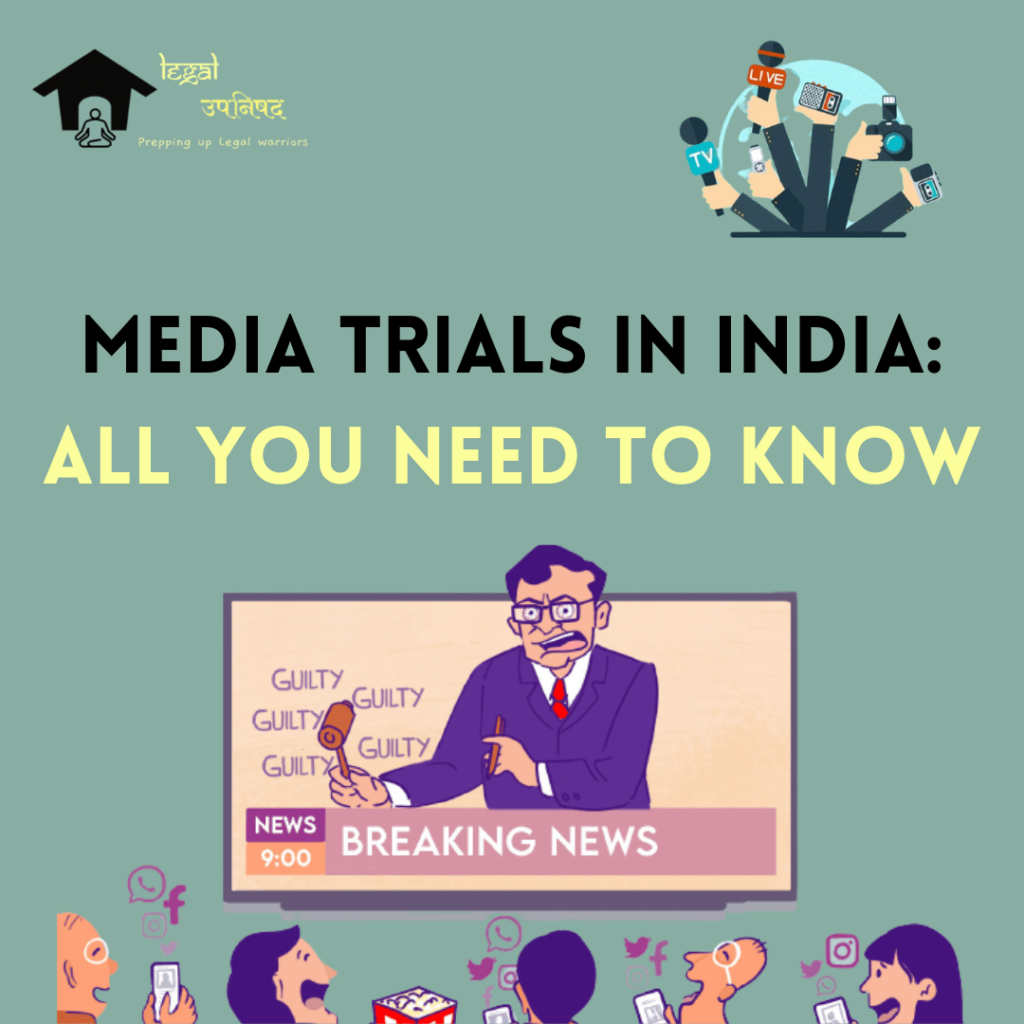This article on ‘MEDIA TRIALS IN INDIA‘ is written by Shubham Agarwal, a 5th year student from Sharda University and an intern at Legal Upanishad.
INTRODUCTION
This article talks about the Media trials in India. The functioning of the media trials in India and all you need to know about the Media Trials in India. For the administration of healthy democracy in the nation, Role of media is important and vital in nature. As primary function of media houses is to bring the news or an issue in knowledge of peoples in the society so that everyone shall have opinion over any issue; as true reporting of any issue is the main duty of journalists which helps in delivering justice to the victim by creates immense pressure over the legislature, administration and the judiciary to take right action within a stipulated time.
“Media is the fourth pillar of Indian Democracy”
Nowadays, media is playing a role of the public courts by overruling the cardinal principle of ‘presumption of innocence until proven guilty’ as media starts separate investigation in their news channels by investigating the facts and circumstances of any incident and this type of investigation known as the media trial. It results in forming the public opinion against any suspect even before decision of the case.
Media Trials
The impact of news coverage which telecast on television on any issue related with reputation of the suspect related with an instance mostly by evaluating and investigating high-profile individual cases rapidly with the purpose of creating a whole perception of guilt or innocence before or after verdict of the court.
Making a perception in the form of propaganda by reporting of the cases, taking interview of victim, decreased family, accused or his family and showcasing each new fact of the case as headline causes great loss on the reputation of any suspect as our Indian punishment system works on reformation approach.
After punishment when accused enters in front of the society he need to suffers many other challenges as peoples of the society denies to accept him because of trial reported by the media houses against an accused person as perception created in the mind of the peoples of the society that accepting him is not in beneficial for the health of the society. (Sehgal, 2021)
“Media should report true cases rather than creating propaganda.”
Doctrine of ‘Presumption of innocence until proven guilty’
It is a cardinal principal under legal administration system which means “that every person accused of any crime is considered innocent until proven guilty”. The media plays a role of the public courts by analysing the facts & circumstances of an instances that causes defamation on the reputation of the suspect as before proven guilty media try to make suspect culprit by converting any issue into propaganda. (Service, 2021)
Doctrine of ‘Separation of Power’
According to this principle, the separate institution of the government which comprises; legislature, executive, and judiciary shall not interfere with the powers and responsibilities of other institution of the Government so there shall not be conflict between each branch of the Government.
Judiciary is authorised and solely responsible to try the case of any suspect by analysing facts and circumstances of the case according to rule of law and finally dispose of the matter. With the media trials journalist breach the doctrine of ‘Separation of Power’ by playing functions of the public courts. (WIKIPEDIA, n.d.)
Media Trials in India
As India is a developing country every media house is finding a way of stepping into the shoe name profit; the focus of Indian journalism is on selling news rather than delivering news as there is no healthy competition between different media houses. Maximum journalists don’t want to follow principles, morals and ethics laid down in the Constitution in India as they present instance by mixing species on any issue as per there taste or as per taste of the viewers as their main motive is to gain more and more views on their telecast.


In late 20th century and early 21st century media trials in India is very popular and common as before or after conviction of suspect journalist rush to take interview and starts collecting the evidence of the case as there is an anticipated upsurge in curiosity. Journalist working under the media houses works as representative of public courts with focus on who they will provide breaking news first by using any form of television, newspaper, radio, or an internet. They create opinion of the public by evaluating and presenting the case as per their dictionary and interests which causes negative impact on the right of fair trial by the Court of any suspect or an accused. (Sehgal, 2021)
Is Investigative Journalism is prohibited in the territory of India?
When any sensational issue collide with the media houses for which trial is sanctioned before the court, then on that issue peoples is having the curiosity to be known with latest update on the case through media including television channels, newspaper, radio, or internet websites, etc.
It results in media starts interpreting their own facts as per their knowledge without any proper authentication this phenomenon is known as Investigative Journalism and is not prohibited in India as Article 19 1(a) of the Indian Constitution 1950 which deals with the Freedom of Speech and Expression also includes Freedom of Press but there are reasonable restrictions under Article 19 (2) of the Indian Constitution, 1950 which is to be follow by the journalist working for the country. (Sehgal, 2021)
Contempt of Court under reasonable restriction
The Court enjoys the power and privilege to punish any individual for the contempt if the judge feels that any person with his behavior obstruct in the administration of justice or disobey the judge. The media houses can be liable for the contempt of court if they breach or try to harm the integrity, authority, justice, and discipline of authority of the Court or act against any officer of the court and shall be liable to fine or imprisonment or both. (India)
The Delhi Rape Case (Mukesh & Anr vs State For Nct Of Delhi & Ors, 2017)
A 23-year-old girl who was travelling in a private bus with her male friend on 16th December 2012 were raped brutally and beaten by the driver and six men on the bus after she was admitted to the hospital and after eleventh day, she was shifted for an emergency to the hospital in Singapore but unfortunately died after two days of hospitalization.
The girl is represented with fictious name called ‘Nirbhaya’ which means ‘Fearless’ as Court given protection to the victim and her family. The incident reported extensive media coverage nationally and internationally that results in many protests occurred in different parts of the country against the central and state governments for failing in his duty to provide security to the woman. Due to the role of the media, protestors, civil societies and the Government there were multiple amendments in the laws including the Juvenile Justice Act, where the age of punishment for heinous offences reduced from eighteen years to sixteen years.
Pros and Cons of the Media Trials in India
The Supreme Court of India in various wordings held that role of media is very important for the establishment of healthy democracy in India. Due to heavy coverage of the issues, it puts pressure on the administration to take the strict and immediate action against the suspected person, government introduce law amendment bills in the Parliament for effective application of the laws in India and the judiciary give their 100% to provide speedy justice to victim.
Media trial also results in negative impact on personal & professional life of an accused as investigation of facts by media houses with the aim of representation of suspected individual as an accused before the decision of the court causes great loss of reputation and guilty in mind of an accused. (Sehgal, 2021)
Suggestions and Conclusion
Application of laws never fails if administration uses his privileges as per their authority. In modern India, media is the fourth pillar of the Democracy with free and fair journalism the issue of the state resolves easily, media works for the public by taking their opinions. Media plays a role of the mediator between the peoples of the society and other three branches of the government so that healthy democratic system shall be established & prevailed within the Country.
Converting any issue into propaganda is not considered reasonable under media administration system for any of the Nation, as legal doctrine of public interest remains unfulfilled. Trial by media by interpretation and Investigation of the facts and circumstances with application of own half knowledge is not considered reasonable for the criminal justice system.
References
India, G. o. (n.d.). Constitution of India. Retrieved from legislative.gov.in: https://legislative.gov.in/sites/default/files/COI…pdf
Mukesh & Anr vs State For Nct Of Delhi & Ors , SLP No. 3119-3120 of 2014 (The SUPREME COURT OF INDIA May 2017, 2017).
Sehgal, D. R. (2021, Mar 10). Famous cases of media trials in India. Retrieved from iPleaders: https://blog.ipleaders.in/famous-cases-media-trials-india/#:~:text=It%20is%20called%20investigative%20journalism,or%20%E2%80%9D%20Trial%20by%20Media%E2%80%9D.
Service, E. N. (2021, September 9). No presumption of innocence . Retrieved from The Indian Express: https://indianexpress.com/article/india/no-presumption-of-innocence-once-a-person-is-convicted-by-trial-court-supreme-court-7497739/
WIKIPEDIA. (n.d.). Separation of Powers. Retrieved from Wikipedia the free encyclopedia: https://en.wikipedia.org/wiki/Separation_of_powers

